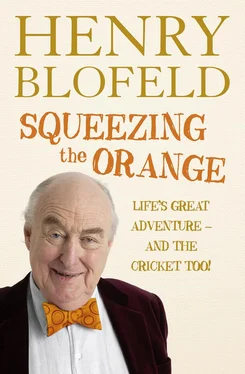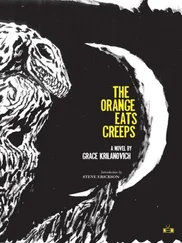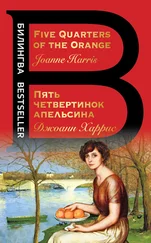The cast at Sunningdale was nothing if not Wodehousian. Mr Fox, who went by the Christian names of George Dacre (PGW had a housemaster called Dacre in Tales of St Austin’s ), had signed up in 1906. Maybe there was something of the Reverend Aubrey Upjohn (Bertie Wooster’s private-school headmaster) in Mr Fox, and I have no doubt that they would have hit it off like a couple of sailors on shore leave. By the time I met Mr Fox his face was inordinately lined, craggy and ancient, and would have made the Gutenberg Bible look to its laurels. To us, Mr Fox seemed older than God, and spoke in a slow, sepulchral tone that did nothing to make me think I was about to make a lifelong friend. He frightened me out of my socks, and beat me in the fourth-form classroom at the top of the stairs on the left whenever I kicked over the traces. A stern lecture would be followed by six relatively mild strokes, after which I would be told to leave. As many of the other boys as possible would have been standing outside the door to count the number of strokes. Six was the usual complement, but for something truly hideous, the count may have reached eight, making the recipient a sore-bottomed hero, but even to receive six did your street cred no harm. Mr Fox was known to us as ‘Foe’, and come to think of it, it was not a bad nickname, for I don’t think I ever felt entirely convinced that he was on my side. He was five foot seven or eight, and his strong head of black hair was combed back and much adorned with Mr Thomas’s finest unction. Mr Thomas was the school haircutter, and he came down from his HQ in Bury Street SW1 twice a term with two or three of his cohorts to cut our hair. Several masters had their hair cut too, including Foe, who was on Christian-name terms with the rotund, avuncular, noisy and highly genial Mr Thomas, who laughed a good deal as he snapped the scissors like the well-seasoned performer he was. I don’t know why, but it went slightly against the grain that Mr Fox was on first-name terms with his barber. When the two of them laughed there was always something slightly conspiratorial in the air, as if they were planning a visit to a particularly shady club.
Mr Fox took the fourth form, and never encouraged jocularity, although there were times when I am sure he felt he was being the star of the party. But he always made teaching seem a solemn business, and was seldom fun and never funny. He had written a well-known green-covered history date book, which was not so much compulsive as compelled reading. It was all there, from Hengist and Horsa and Ethelred the Unready to the present day. Mr Fox was as proud of his date book as if he had made up the dates himself and given the history of this country both order and meaning. He did have another side to him – to keep themselves sane, a good many schoolmasters must lead double lives. The day the term finished at Sunningdale, the sofa in the Foxes’ drawing room was pushed back, and out came the bridge tables, swiftly followed by the packs of cards and scoresheets, and then by those of his neighbours who participated. The stakes were said to be high; I imagine Foe was probably a gambler, but in a guarded rather than a reckless manner. I should think he was a pretty good player who seldom settled for three no trumps when a slam was in the air.
He was a great racing man too, and a number of important trainers sent their boys to Sunningdale. Cecil Boyd-Rochfort’s twin stepsons, David and Henry Cecil, were naughty and great fun. Of course Henry went on to become a remarkable trainer in his own right, picking up a knighthood and Frankel along the way before dying horribly of cancer. Peter Cazalet, the Queen Mother’s trainer, sent both his sons to Sunningdale. Edward, the elder, became a High Court judge, and as his mother, Leonora, had been PGW’s stepdaughter, controls all things Wodehouse today with charm, skill and high good humour. Noel Cannon’s son was also at the school. Royal Ascot week caused a good deal of activity on the private side, as Mr Fox’s quarters were known. Lots of chaps were seen wandering about the place in morning coats and silk toppers, and ladies in extravagant hats were plentiful. I don’t think a hat, however extravagant, would have made a significant difference to Mrs Fox, who may once have been a great beauty, but if she had been, by the time I met her she was playing from memory.
I don’t know if Foe’s gambling inclinations explored other avenues. I doubt that he was a casino man, unlike R.J.O. Meyer, the famous headmaster of Millfield, who when the day’s duties were over would drive all the way from Somerset to a gaming club in Mayfair with a goodly portion of that term’s school fees in his trouser pocket. Rumour has it that when he plonked it all on red, black almost invariably turned up. On the somewhat daunting return journey in the middle of the night I dare say he would have found it difficult to stick to the speed limit.
To us boys there was no visible lighter side to dear old Foe, who said grace before lunch with a basso profundo solemnity and sang in chapel in a toneless voice somewhere around the baritone mark. He never made much of the high notes. His sermons always seemed to contain some less than compelling strictures; Mr Burrows was not a giggle a minute in the pulpit either and he made it all too plain what the devil had in store for us if we didn’t look sharp. They both made you feel they were arm in arm with the wrath of God. Tuppy took the services in chapel, and wore a surplice as a jovial sort of holy disguise. Miss Paterson (‘Patey’), who sang with a rigorous and tuneless vigour, sat two rows behind the Foxes, who were immediately behind us new boys. Mr Ling, whom we have not yet come across, and who more closely resembled a Chinese god than any Chinese god I have ever seen, did his best in the row in between. The more jolly Mrs Ling clocked in only on Sundays. They sang dutifully, while Mr Sheepshanks, ‘Sheepy’ to us all, played the organ and sang enthusiastically at the same time. Psalms were always harder work than the hymns, and I was glad when we had got the Magnificat and the Te Deum out of the way as well.
Mrs Fox went by the name of Nancy, which didn’t really fit the bill – although Lucretia would have been a bit too severe. I can’t remember Mr Fox ever looking dreamily at her and murmuring, ‘Nancy.’ Maybe he only did this in extremis. Anyway, she remorselessly called him ‘Foxy’, and they begat two sons, both Sunningdalians. By the time I came across George Dacre and Nancy, I suspect they were well past moments of high passion, and neither of them appeared particularly flighty. Mrs Fox looked a little bit like my idea of B. Wooster’s Aunt Agatha, with more than a touch of Lady Constance Keeble, Lord Emsworth’s bloody-minded sister, thrown in. She gave out boiled sweets by the stairwell outside the dining room after lunch on Sundays, Tuesdays and Thursdays with gratuitous suspicion. Eight on Sundays, six on Thursdays, and a chocolate or Mars bar on Tuesdays. They were counted with great exactitude. If, on a recount, she discovered one sweet too many, it was a capital offence and you were lucky if she only took two away.
Mr Burrows was number two in the batting order after Mr Fox, and he didn’t come across well. To a small boy he was alarming, and anyone could be forgiven for thinking at first that he was an all-round shit. I don’t think he liked or felt comfortable with the smallest boys, and there was always a suspicion that he may have been a repressed homosexual. As far as Wodehouse was concerned, most of the time Burrows would have made Roderick Spode, alias Lord Sidcup, alias Oswald Mosley, seem a decent sort of cove. He was slim, reasonably tall and slightly bent. I think he probably had a sense of humour, but he was careful whom he showed it to. When I first came across him he was very much the Dickensian schoolmaster, but if, for whatever reason, you came into prolonged contact with him – as I did when I kept goal for the school and went on to become an unlikely captain of soccer – he was much easier. I then found a friendlier, more amenable side to him. Perhaps he was rather shy at heart, and it was only when he felt comfortable with certain boys that his outer shell fell away. I never knew what his football qualifications were, but obviously he knew a bit about the game. Whenever we played against other schools he would be mildly unforgiving at half time as we surrounded him in a group, each sucking a quarter of a raw lemon in the hope that it might turn us into Stanley Matthews. Burrows was a serious supporter of Newcastle United, and if you mentioned Jackie Milburn there was an outside chance that he might smile, and he would certainly look more favourably upon you. George Beaumont, a good friend of mine who was a member of the Allendale family, came from Northumberland, and was also passionate about Newcastle and Milburn, which meant that he and Mr Burrows became friends. He was a fine outside right, who ran fast and controlled the ball well. George was sadly killed in an aeroplane crash in New Zealand soon after leaving Eton.
Читать дальше












